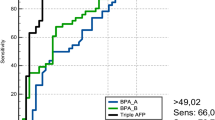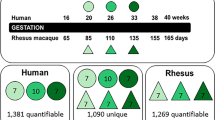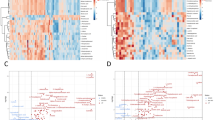Abstract
Summary: Free carnitine levels were determined in amniotic fluids between the 10th and 40th week of gestation. They were found to decrease significantly with gestational age. Blood levels of carnitine were lower in pregnant than in non pregnant women. Levels were found to be higher in cord blood than in maternal blood and usually were higher in the umbilical artery than vein. Intra-arterial injection of L-carnitine into a pregnant ewe did not cause a rise in the fetal blood level of carnitine, which, in contrast to human fetal blood, contained less than half the level of carnitine in maternal blood.
Speculation: It is suggested that the placenta may play a role in carnitine transport from mother to fetus and that fetal blood and amniotic fluid levels may reflect retention of carnitine by fetal tissues.
Similar content being viewed by others
Log in or create a free account to read this content
Gain free access to this article, as well as selected content from this journal and more on nature.com
or
Author information
Authors and Affiliations
Rights and permissions
About this article
Cite this article
Hahn, P., Skala, J., Seccombe, D. et al. Carnitine Content of Blood and Amniotic Fluid. Pediatr Res 11, 878–880 (1977). https://doi.org/10.1203/00006450-197708000-00003
Issue date:
DOI: https://doi.org/10.1203/00006450-197708000-00003
Keywords
This article is cited by
-
Regulation of maternal–fetal metabolic communication
Cellular and Molecular Life Sciences (2021)
-
Amniotic fluid propionylcarnitine in methylmalonic aciduria
Journal of Inherited Metabolic Disease (1987)
-
Problems related to diet management of maternal phenylketonuria
Journal of Inherited Metabolic Disease (1986)
-
Lipid metabolism in parenterally alimented neonates: carnitine blood concentrations and fat utilization
The Indian Journal of Pediatrics (1983)
-
Carnitine in human nutrition
Zeitschrift für Ernährungswissenschaft (1982)



